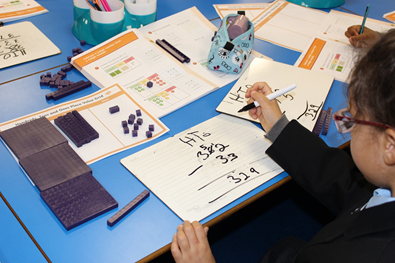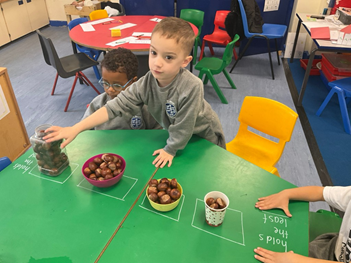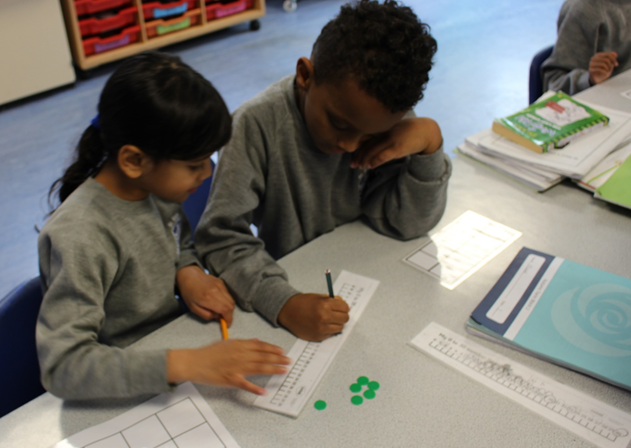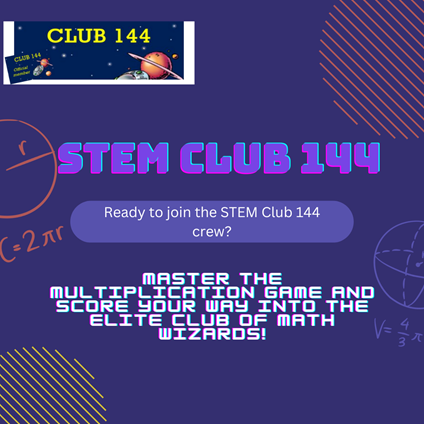Maths



Mathematics Intent
At St Mary’s we offer a high-quality mathematics curriculum that provides a strong foundation for comprehending the world, the capacity for mathematical reasoning, knowledge and appreciation of the power and wonder of mathematics, as well as a sense of enthusiasm and interest about this subject. In order to prepare students for everyday life and future careers, we believe in teaching for a deep understanding and mastery that will allow students to use their mathematical skills in the world around them.
Our aim in maths is for every pupil, regardless of background, to achieve their potential and exceed their own expectations, which is strongly linked to our school mission statement, "Aspiring to Greatness.” We encourage a growth mindset and an "I can" attitude by reinforcing the expectation that all children are capable of achieving high standards in mathematics.
At St Mary’s it is our intent to ensure children will:
- be enthusiastic, inquisitive, lifelong learners: pupils will become proficient in arithmetic and reasoning principles and this in turn will improve their conceptual understanding and the capacity to quickly and accurately recall and apply information in different contexts
- To be strong communicators: pupils will engage in conversations with others and solve mathematical problems by using their knowledge and comprehension of mathematical language. They should be able to do this by comprehending, analysing, interpreting, explaining and evaluating the terminology
- To be well-rounded, independent and resilient learners with aspirations: pupils will be able to answer high-level mathematical questions using their problem-solving skills, developing a deeper understanding in order to successfully overcome challenges
- To develop and use their God given talents by being creative: pupils will achieve and have confidence and belief in their mathematical skills, showing a growth mindset in their mathematical abilities
- To be responsible citizens who are eager to make a positive contribution to their community and wider society: pupils will develop their logical reasoning, critical thinking, creative thinking, abstract and spatial thinking, problem-solving ability, as well as effective communication skills. These skills will help pupils to understand the world and provide an effective way of building mental discipline
Maths Implementation
At St Mary’s, we use the DFE approved White Rose Maths scheme throughout the school to ensure consistency and progression. The White Rose premium resources are used to support teachers planning which they adapt to meet the needs of their class.
Our teachers use a mastery approach to the teaching of maths, making sure that pupils have a solid and deep conceptual grasp of their mathematical learning. This means that teachers may dedicate additional time to specific areas of Maths to ensure pupils have a secure understanding and are able to not just provide an answer but also to explain and illustrate their mathematical thinking and reasoning in a number of ways.
Our mastery approach includes teachers adopting the CPA approach (concrete, pictorial and abstract), giving our pupils the scaffolding they need to engage in learning at all levels. This in turn helps to build fluency and understanding of underlying mathematical concepts.
We place a significant amount of emphasis on transferring information from the short-term to the long-term memory. Each lesson begins with a maths starter that enables pupils to retrieve and consolidate prior knowledge, which is then built upon during the lesson. Additionally, teachers hold weekly Maths meetings that give pupils a fun opportunity to practise applying their knowledge and skills.
We believe it is crucial to give pupils access to a diverse and broad mathematical vocabulary. Teachers set high standards for vocabulary and encourage pupils to speak in full sentences and use appropriate mathematical terminology while speaking with talk partners and participating in class discussions.
Regular and continuous formative assessments are conducted in daily lessons to assess pupils' conceptual and procedural knowledge. Teachers use high-level questioning to continuously assess pupils' learning throughout a lesson and make necessary adaptions. Summative assessments are conducted termly (or half-termly in Y2 and Y6) to support teachers judgements. Both of these formative and summative assessments are used to inform teachers' planning. At pupil progress meetings with the senior leadership team (SLT) every half term, pupils' attainment and progression are discussed, and interventions are put in place to support the pupils if the anticipated steps of progress are not being made.
Teachers use formative and summative assessments to guide them when planning for effective differentiation. Teachers strive to challenge every pupil while making sure they can access the curriculum and feel successful. Learning gaps are identified, and the appropriate support and interventions are implemented to close these gaps. Adults assist pupils with SEND and pupils performing below the age-related expectations in their academic work, and their learning is scaffolded using resources, models, and practical tools. Open-ended tasks, reasoning, problem solving, and investigations are used to enable pupils to dive further into their learning, developing their understanding at a greater depth.
Maths Impact
The impact of our Maths curriculum can be seen in pupils’ books, data and through pupil voice. The impact is the progression, skill application and development and the understanding and relevance of the ability to be able to apply their Math learning to real life concepts.
Pupils can speak confidently and with enthusiasm, showing a positive view of their Maths learning and using subject specific vocabulary to explain their understanding of a method or concept. The pupils' books also demonstrate that math is taught in accordance with the requirements of the national curriculum while ensuring differentiation to allow students from all backgrounds to access the curriculum and feel successful whilst also providing opportunities for greater depth learning to extend and challenge pupils.
Our pupils are avid and passionate learners in Maths due to the learning environment where there is a ‘buzz for learning’ and Math is promoted as an exhilarating and fun subject that involve solving challenging problems, developing their resilience.
Pupils’ progress in Maths is measured through ongoing assessments, end of unit assessments and through three key assessment points during the year. Pupil data is discussed and analysed to ensure attainment and progress is on track in each year group. From these pupil data, discussions, interventions are planned, implemented and evaluated for targeted pupils.
In addition to having strong problem-solving abilities, fluent arithmetic skills, and the ability to reason and express their ideas mathematically, pupils leave St. Mary's with the ability to apply math to many aspects of daily life.
STEM Club 144:
At St Mary's we value excellence and achievement. STEM Club 144 provides all children with the opportunity to improve their times tables in KS2. Individual times table booklets are given as homework every three weeks. Each booklet consists of a range of tables exercises which vary in difficulty.
Every Friday, all KS2 children sit the same 30 question tables quiz based on that booklet's particular table. The questions could be from any fact family in the table (eg 7 x 3 = 21, 3 x 7 = 21, 21 / 3 = 7, 21 / 7 =3). There are additional challenge questions on each quiz to complete afterwards (e.g. 0.9 x 9). They sit each table quiz three times per times table booklet. The idea is that they master each times table and strive improvement week on week.

If the children score 100% and complete their quiz within the time limit set by their teacher. Three scores of 100% within the time limit qualifies a child to try out for STEM Club 144. The try-outs happen every Friday at 2:00pm, where children have to complete a 'secret' challenge. If successful, children will receive a STEM Club 144 card and the opportunity at the end of each term to complete a STEM activity with Mr Howell.
STEM learning teaches children the importance of keeping an open-minded and curious approach, while also understanding how to research and evaluate information. Children are encouraged to ask questions to gain a better understanding of something and develop a growth mindset. Rather than just learning and gathering knowledge, children are encouraged to put the information they learn into practical use.
As children go through their education it’s important that they learn and develop good critical thinking skills, as these skills can be useful in any subject and almost any aspect of their lives.
Useful links:
